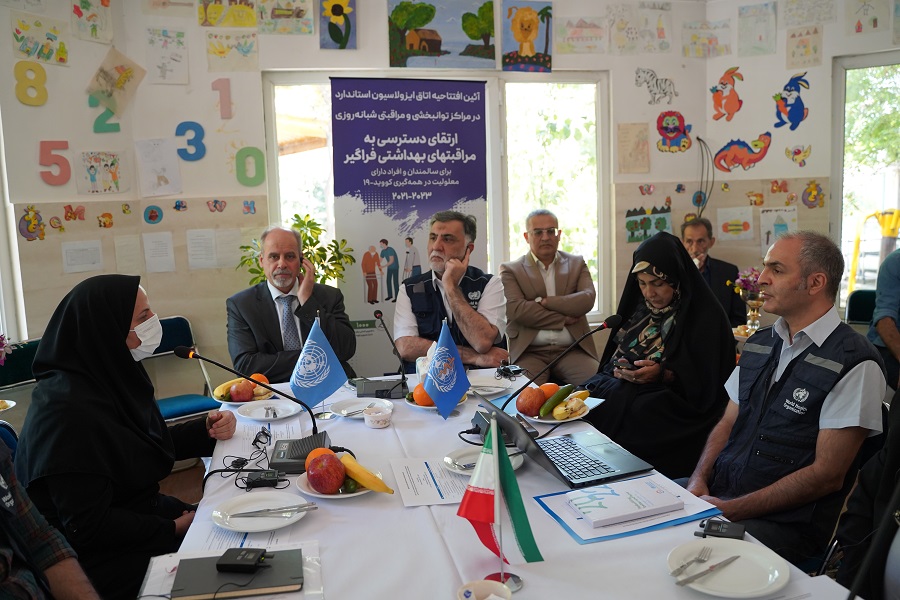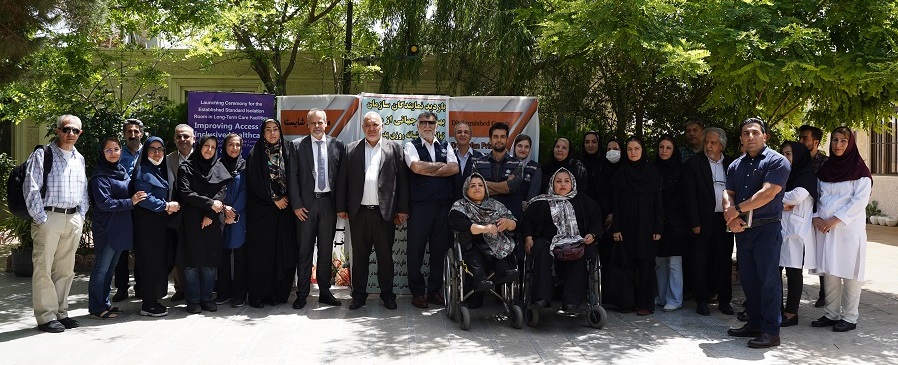29 May 2023 – Marking the success of about 2 years of hard work, WHO and project partners celebrated the opening of a standard isolation room in a select long-term care facility in Pakdasht, Tehran.
The isolation room at this facility and numerous other facilities across the country have been set up as part of the project “Improving access to inclusive health care services for the elderly and people living with disabilities during COVID-19 in Islamic Republic of Iran,” co-funded by WHO, the European Union (ECHO), and the Government of Canada.
During the official launching ceremony, held at “Pedarbozorg” long-term care facility, Mr Stefan Priesner, the United Nations Resident Coordinator, Dr Syed Jaffar Hussain, WHO Representative in Islamic Republic of Iran, Mr Mohsen Ardestani, the Governor of Pakdasht County, Ms Farideh Baghalishahi, the Drector of Rehabilitation and Care Department of the State Welfare Oraganization, and members of the project steering committee discussed the achievements and renewed interest for further collaborations.
 Opening session of the isolation room opening ceremony at Pedarbozorg long-term care facility in Pakdasht, Tehran. Credit: WHO/Islamic Republic of Iran
Opening session of the isolation room opening ceremony at Pedarbozorg long-term care facility in Pakdasht, Tehran. Credit: WHO/Islamic Republic of Iran
Dr Rahim Taghizadeh, Team Lead of the Healthier Population Unit, acknowledged the efforts of the State Welfare Organization, the Ministry of Health and Medical Education, and the project team in achieving:
distribution of 1000 assistive technologies to 961 prioritized recipients across 15 provinces in the country, focusing on low-income households and people with severe disabilities;
provision of access to standard isolation rooms in long-term care facilities for over 7000 persons across in 13 provinces; and
provision of access to quality care to 12 500 older people and people living with disabilities by training about 150 experts, personnel, and service providers over the course of the project.
 Mr Ardestani, Mr Priesner, Dr Hussain and other participants visit the isolation room and the laundry facility at Pedarbozorg long-term care facility in Pakdasht, Tehran. Credit: WHO/Islamic Republic of Iran
Mr Ardestani, Mr Priesner, Dr Hussain and other participants visit the isolation room and the laundry facility at Pedarbozorg long-term care facility in Pakdasht, Tehran. Credit: WHO/Islamic Republic of Iran
The Director of the Rehabilitation and Care Department of the State Welfare Organization Ms Baghalishahi acknowledged the effective collaboration of partners to provide support to the vulnerable population at long-term care facilities and people living with disabilities residing at their homes. She emphasized the significance of the technical components of the project and highlighted the effectiveness of training caregivers and facility staff, who have been at the frontline of COVID-19 management and care for the target group since 2020.
“This project has resulted in great achievements. It is my pleasure to see that these have been the results of collaboration among so many actors. We have recently started a new collaboration framework for 2023–2027 with the Islamic Republic of Iran and the achievements of this project will certainly serve its collaborative function, especially under the disability flagship programme that is aimed for our targeted and participatory action for people living with disabilities,” stated Mr Priesner, following the presentation on project results by WHO.
“The robust multisectoral and multi-level collaboration seen today was strongly encouraged by WHO and supported by the governmental and nongovernmental partners and academic and professional institutions who dedicated almost 2 years of hard work, coordination, technical input, and focus to delivering these results in a more inclusive and equitable manner based on community engagement,” said Dr Syed Jaffar Hussain, WHO Representative to the Islamic Republic of Iran.
The project steering committee members offered their feedback on the collaborative experience and pointed out that the inclusive activities under this project would benefit a diverse group of beneficiaries from Iranian and refugee communities. “We are proud to contribute to such a participatory project, where we can say with utter confidence that the results of actions are received by the most eligible beneficiaries in urgent need for service,” highlighted Ms Bashardoust, member of the project steering committee and head of Farzanegan nongovernmental organization working with the elderly communities in Tehran.
Mr Jafari, the CEO of Pedarbozorg expressed his gratitude for the provided technical support together with the high-quality supplies for establishing the isolation rooms during the project. In addition, he emphasized the need for continuing support for facilities caring for the vulnerable and people living with disability, flagging up the challenges to access life-saving medicines and supplies during the past months.
Dr Hussain reiterated, “We hope, and we also encourage our partners, to consider this collaboration only as a starting point for bigger results and more collaboration, benefiting older persons and people living with disabilities.”
The ceremony concluded with participants visiting the isolation room and laundry facility set up during the project.
 Attendees of the isolation room opening ceremony took at Pedarbozorg long-term care facility in Pakdasht, Tehran. Credit: WHO/Islamic Republic of Iran
Attendees of the isolation room opening ceremony took at Pedarbozorg long-term care facility in Pakdasht, Tehran. Credit: WHO/Islamic Republic of Iran
The European Union and its Member States are the world’s leading donor of humanitarian aid. Through its Civil Protection and Humanitarian Aid Operations department (ECHO), the European Union helps millions of victims of conflict and disasters every year. With headquarters in Brussels and a global network of field offices, the EU provides assistance to the most vulnerable people on the basis of humanitarian needs.




